 |
Index
|
Index
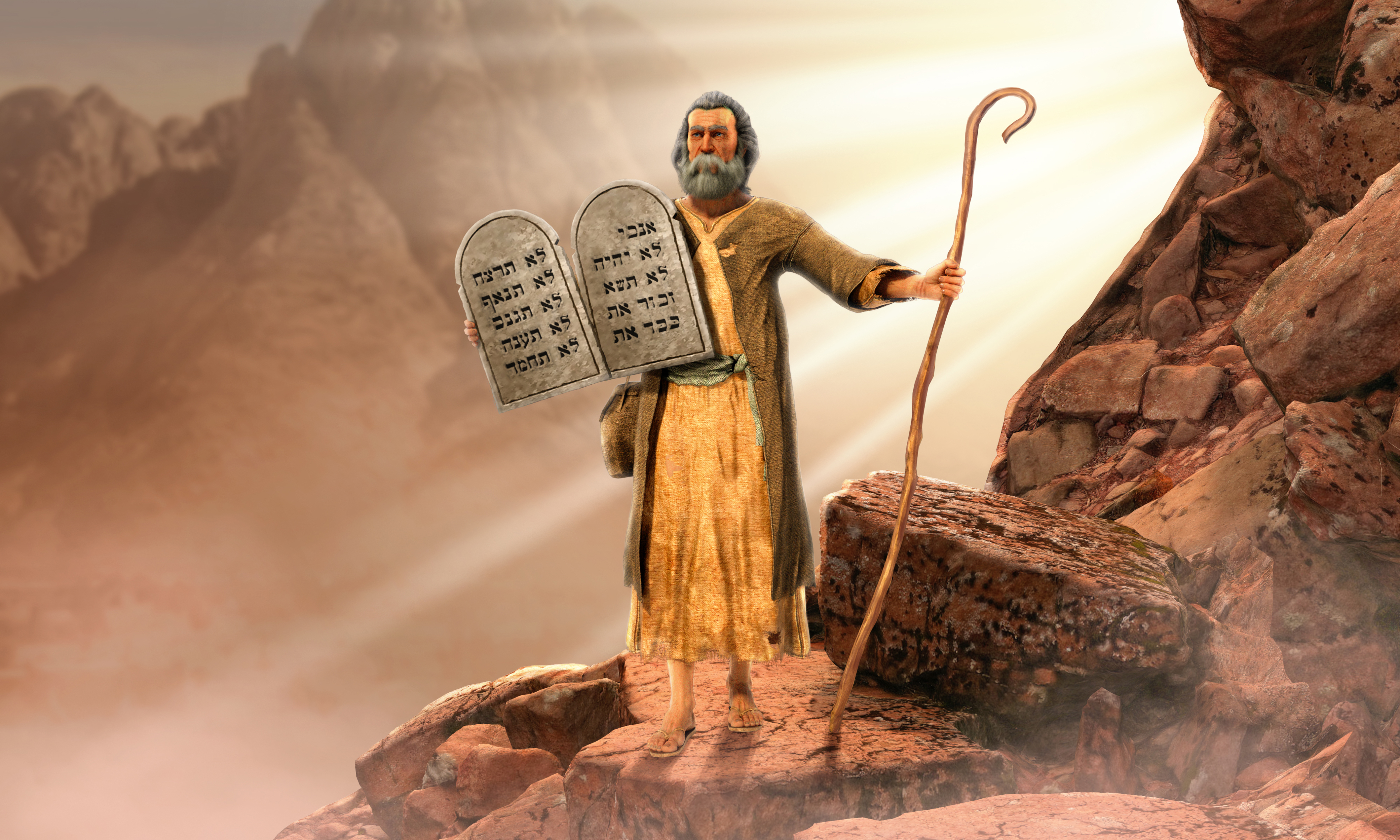
Moses on Mount Sinai.
5 For the earth was defiled
Under its inhabitants;
Because they transgressed teachings,
Violated laws,
Broke the ancient covenant.
6 That is why a curse consumes the earth,
And its inhabitants pay the penalty;
That is why earth's dwellers have dwindled,
And but few men are left.
Isaiah 24:5-6 (Tanakh)
David's Tent was razed to the ground by the House of Desolation and by Paul et al. The House of Desolation rejected their Messiah and sought His execution. Paul et al have violated Covenant Law and annulled the ancient Covenant, claiming the authority, power, and guidance of the Lord Spirit. Consequently, the land lies under a curse.
I hope that you will allow a brief personal account of how I arrived at this approach!
At Crusader Bible classes, every effort was made to convey God's character, values, and standards. So there was no great jump in mapping what I'd been taught to what I term the 'Prime Axioms' (used in a math context).
However, at one point in my research, I came across an interesting verse, namely Hosea 6:7! My interest was piqued by its ambiguity. What was the true force of the words? Had the Lord hidden its meaning in deliberate obfuscation? Had the translators got to the heart of the matter? Had the translators listened to the woke-masters, those creatures more concerned with claiming the high moral ground, rewriting history to their own personal taste, putting political correctness above understanding and truth, and who were too lazy to explore the literal wording of the text? Had the Lord hidden the meaning of the text in word-play which would be destroyed by the translations of the blind and the woke-masters alike?
Were the differences between translations that important? In the great scheme of things, did those differences really matter? Was one short sentence really that significant? Here are a few translations:
Adam's name immediately caught my eye! The words for 'man' and 'Adam' are similar. There was a real possibility that the Lord God was muddying the waters, for we know that both He and His Son obfuscate their message in order to hide it from those who are perishing (see Obfuscation). The other possibility was that God actually was referring to Adam, rather than men in general!
Having enumerated the alternatives, it was necessary to consider the implications and significance which might be attached to each of them.†
[† On a matter of method, one can, if preferred, write down the alternatives, as has been done above. Each alternative can then be expanded by listing its implications. Weights may be allocated on the basis of perceived significance. It may then be possible to arrive at some conclusion. The conclusion can then be tested. There is a useful chapter on decision making in Logic, the Essentials.]
Of the alternatives, above, a reference to Adam seemed to be the most significant. This placed the translations of Tanakh and KJV in the discard.‡
[‡ These translastions were adding nothing new to knowledge or understanding, since mankind's inclination towards evil was already documented in Gen.6:5-7. Whereas the mention of Adam opened up new possibilities which were worth exploring.]
The ESV referred to Adam in terms of 'the covenant'. The definite article would tend to lead people to think that the reference was to the Old [Mosaic] Covenant - a contract which did not exist at the time of Adam and Eve. Therefore the ESV [translation] was discarded.
On the other hand, the indefinite article used in 'a covenant' - YLT - suggested an unspecified contract. It implied that a contract was in existence at the time of Adam, a contract which may or may not have been the same as that which later applied to Israel. In other words, the text implied a similarity between Adam and Israel insofar as each had broken a God-given contract. The YLT translation seemed to be worth pursuing!
The problem here was that - unlike the formal contract which existed between God and Israel (the Mosaic Contract) - there was no record of a formal contract between God and mankind in the Garden Annex. This now posed an interesting question. Why would God want a contract between Himself and Adam?
So, if the reference was in fact to a comparison between Adam and Israel (ie, as per the YLT translation), then what did that commit the Lord God to in terms of a contract between Himself and Adam? (What followed was a form of conditional proof (Logic, the Essentials)).
One clue lay in what I call the 'Prime Axioms', those statements which define God's values and His attitude to right and wrong, perfection and imperfection. They suggested that there might be a Code of Conduct and a set of House Rules such as might be posted in a person's home:

House Rules
Another clue - which seemed to negate the concept of a set of House Rules - was contained in Jesus' words that guilt could not be attributed in the absence of knowledge and understanding:
Jesus said, "If you were blind, you would not be guilty of sin; but now that you claim you can see, your guilt remains." (John 9:41 NIV)
Therefore, if Adam - on entering God's presence in the Garden Annex - didn't know and understand God's rules, regulations, and definitions of perfection, then how could he be held to account by God? So what was to stop Adam trampling all over God's home without any regard for God's House Rules, running amok like some visitor from hell?
Anyone who has had the visitors from hell running amok in their home will identify with the problem and the need for a solution! But did a solution exist and, if it did, then how could it be implemented?
The conclusion of this line of enquiry resulted in what, for want of a better title, I call the 'Primary Contract' - 'primary' because it was a sine qua non for new arrivals to God's presence. The details need not be repeated here, for they may be found in Prime Axioms and The Primary Contract.
The conclusion, as to the Primary Contract, made complete sense. However, it was necessary to test it! Would it hold up? What was its scope? Was there consistency?
On examination, it was found that the Primary Contract applies to all who seek to enter into God's presence and dwell there, for God's House Rules were in place even before His Son was begotten in Heaven. And so a Primary Contract applies equally to God's Son, and is contained in the Trinity Contract. Moreover, the Primary Contract with mankind will continue to apply to those who will dwell in the New Jerusalem. The only place where the Primary Contract will not apply will be in Hell, that place reserved for all who reject or disobey God.
Furthermore, the Primary Contract was to prove useful in analysing the content of the Epistles.
Some of Paul's doctrine had long been suspect in my eyes, though I couldn't explain the reasons. But I found that the existence of the Primary Contract trashed many of Paul's words; for example:
Therefore, just as sin entered the world through one man, and death through sin, and in this way death came to all people, because all sinned---
13 To be sure, sin was in the world before the law was given, but sin is not charged against anyone's account where there is no law. 14 Nevertheless, death reigned from the time of Adam to the time of Moses, even over those who did not sin by breaking a command, as did Adam, who is a pattern of the one to come.
15 But the gift is not like the trespass. For if the many died by the trespass of the one man, how much more did God's grace and the gift that came by the grace of the one man, Jesus Christ, overflow to the many! 16 Nor can the gift of God be compared with the result of one man's sin: The judgment followed one sin and brought condemnation, but the gift followed many trespasses and brought justification. 17 For if, by the trespass of the one man, death reigned through that one man, how much more will those who receive God's abundant provision of grace and of the gift of righteousness reign in life through the one man, Jesus Christ!
18 Consequently, just as one trespass resulted in condemnation for all people, so also one righteous act resulted in justification and life for all people. 19 For just as through the disobedience of the one man the many were made sinners, so also through the obedience of the one man the many will be made righteous. (Romans 5:12-19 NIV)
In this passage, Paul states:
... for before the law was given, sin was in the world. But sin is not taken into account when there is no law. (Romans 5:13 NIV)
Since - according to Paul! - 'sin is not taken into account when there is no law', the only way in which people could be convicted of sin was through the 'original sin' of Adam. Paul continues his explanation;
But the gift is not like the trespass. For if the many died by the trespass of the one man, how much more did God's grace and the gift that came by the grace of the one man, Jesus Christ, overflow to the many! (Romans 5:15 NIV)
'For if the many died by the trespass of one man': here, Paul invokes 'original sin' to account for the sinfulness of those who lived before the Law was given and for whom sin was not taken into account. The implication here of 'original sin' is anathema to the Most High:
In those days people will no longer say, 'The fathers have eaten sour grapes, and the children's teeth are set on edge.' 30 Instead, everyone will die for his own sin; whoever eats sour grapes---his own teeth will be set on edge. (Jeremiah 31:29-30 NIV)
And the concept of original sin is, in fact, banned by Him:
The word of the Lord came to me:
2 "What do you people mean by quoting this proverb about the land of Israel:
"'The fathers eat sour grapes, and the children's teeth are set on edge'?
3 "As surely as I live, declares the Sovereign Lord, you will no longer quote this proverb in Israel. 4 For every living soul belongs to me, the father as well as the son---both alike belong to me. The soul who sins is the one who will die." (Ezekiel 18:1-4 NIV et seq)
Paul then goes on to describe the purpose of the Law:
The law was added so that the trespass might increase. (Romans 5:20 NIV)
With the result that:
But where sin increased, grace increased all the more, (Romans 5:20 NIV)
The Primary Contract not only reveals Paul's errors, but confirms that they are lies which proceed from the mouth of his father, the Lord Satan. Compare to Peter:
[22] Peter took him aside and began to rebuke him. "Never, Lord!" he said. "This shall never happen to you!"
[23] Jesus turned and said to Peter, "Get behind me, Satan! You are a stumbling block to me; you do not have in mind the things of God, but the things of men." (Matthew 16:22-23 NIV)
Yet the magnitude of Paul's wrongdoing is infinitely greater than Peter's because, in claiming the Spirit's guidance and authority, Paul has dissed the Spirit which, in turn, makes Paul's wrongdoing unforgivable.
[Essay: In any study of Scripture it is essential to go right back to the original words contained in Scripture.]
See Contracts
The instantiation of the Mosaic Covenant showed it to be a contract in its own right:
3 Moses went and repeated to the people all the commands of the LORD and all the rules; and all the people answered with one voice, saying, “All the things that the LORD has commanded we will do!" 4 Moses then wrote down all the commands of the LORD.
Early in the morning, he set up an altar at the foot of the mountain, with twelve pillars for the twelve tribes of Israel. 5 He designated some young men among the Israelites, and they offered burnt offerings and sacrificed bulls as offerings of well-being to the LORD. 6 Moses took one part of the blood and put it in basins, and the other part of the blood he dashed against the altar. 7 Then he took the record of the covenant and read it aloud to the people. And they said, “All that the LORD has spokenwe will faithfully do!" 8 Moses took the blood and dashed it on the people and said, “This is the blood of the covenant that the LORD now makes with you concerning all these commands.”(Exodus 24:3-8 (Tanakh))
On the other hand, an analysis of the Mosaic Law showed that it contained such topics as:
These topics can be mapped to contracts encapsulated in the Mosaic Covenant, here labelled as a contract since that is also what it is:
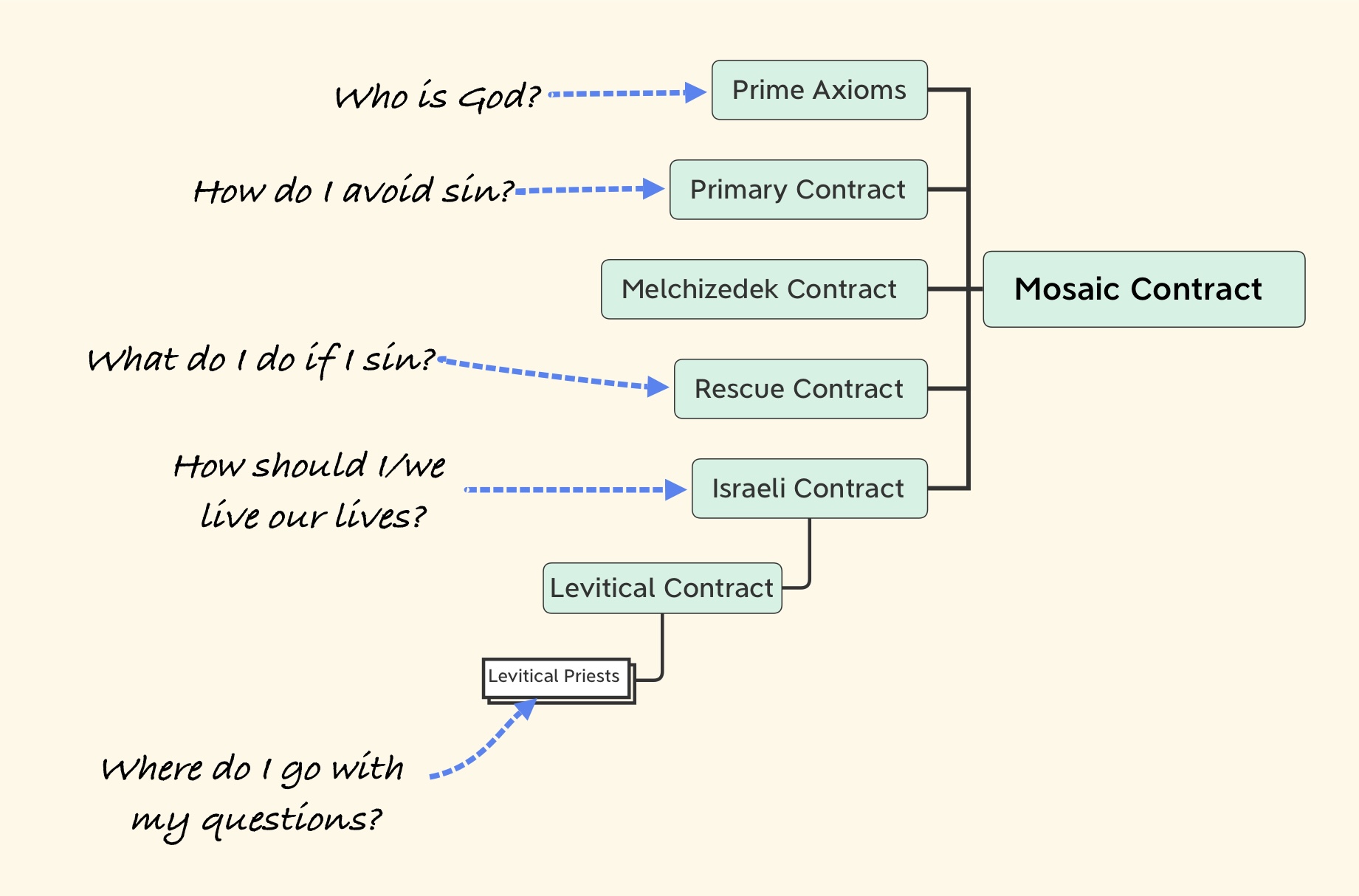
Children's schematic of the Mosaic Covenant
The Mosaic Covenant, since it is a contract and a container, has full access to its components, illustrated here with regard to the Law:
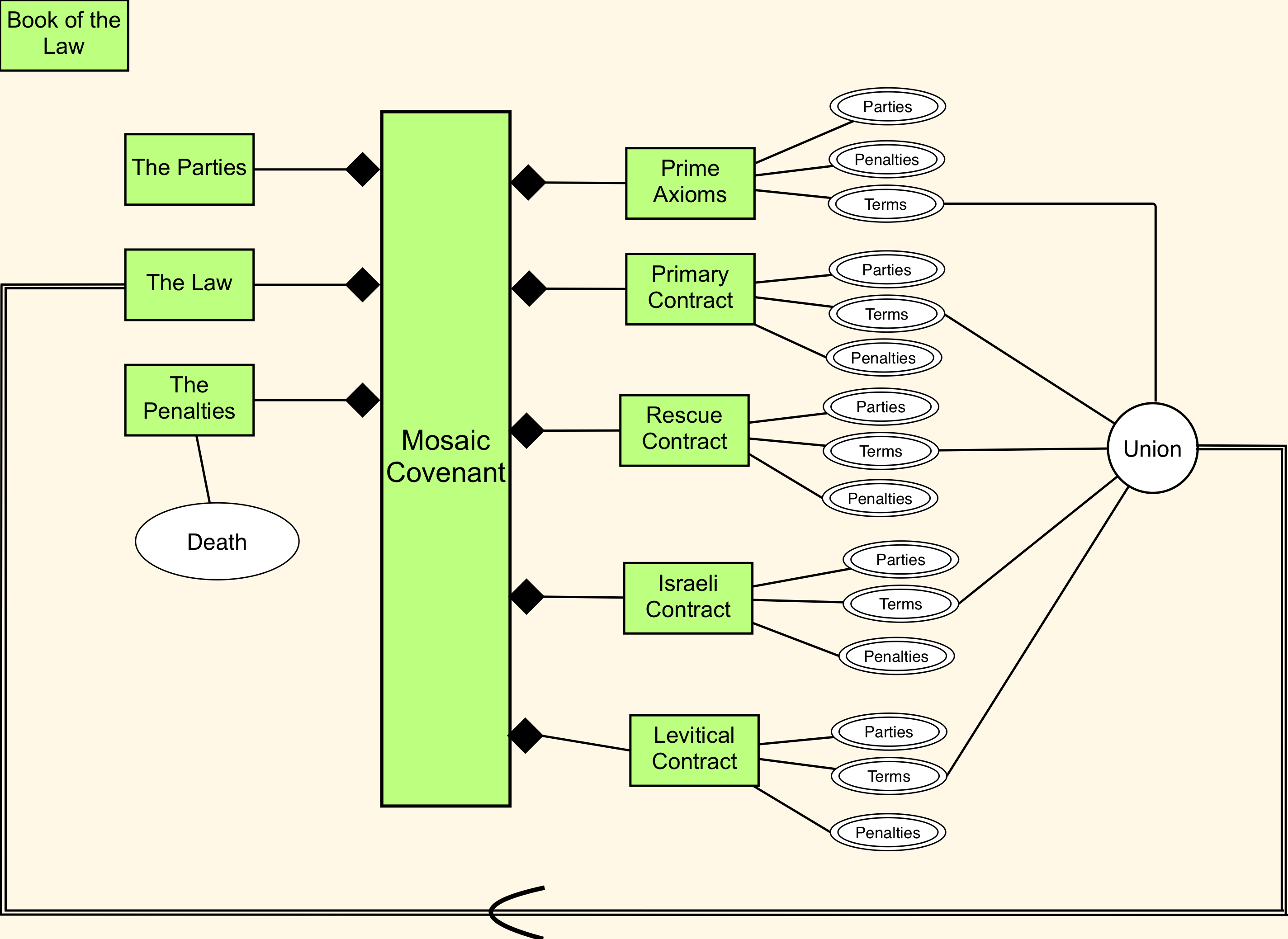
The Law
'The Law', the public interface. is formed from the union of the terms of the component contracts. Similarly for parties, penalties (here summarised as 'Death'), and so on. Note that this gives the Covenant flexibility, allowing components to be added or dropped as circumstances require. Note, too, that although some schematics are presented in EER or UML or mind map form, it is the Lord God Himself - not some computer program - who has complete access to the Covenant and all its components.
Is the Covenant a contract? Does it conform to the rules?
See AQA Law.
A contract must conform to certain rules:
We might paraphrase these rules by saying that each party to the contract must benefit from each of the other parties, that each party must contribute value to each of the other parties, and that all parties must agree to be legally bound by the terms and conditions of the agreement.
Each party must receive value from each of the other parties.
Now then, if you will obey Me faithfully and keep My covenant, you shall be My treasured possession among all the peoples (Exodus 19:5a (Tanakh))
"You shall be to Me a kingdom of priests and a holy nation" (Exodus 19:6 (Tanakh))
The agreement is, ostensibly, to be between God and the nation of Israel. Though, in actual fact, Jesus is represented in the Covenant† and, together with His Father, is an offerer of the contract to the House of Israel.
† See: Jesus - representation in Covenant Law.
Israel will benefit:
God will benefit:
The cost to each party. The loss suffered by each party in giving benefit to each of the other parties.
The price Israel must pay:
The price the Lord God must pay:
[Analysis:
1 Ho, all who are thirsty,
Come for water,
Even if you have no money;
Come, buy food and eat:
Buy food without money,
Wine and milk without cost.
2 Why do you spend money for what is not bread,
Your earnings for what does not satisfy?
Give heed to Me,
And you shall eat choice food
And enjoy the richest viands. (Isaiah 55:1-2 (Tanakh))]
The intention to be legally bound by the terms of the contract.
The Lord God:
The word which came to Jeremiah from the LORD:
2 “Hear the terms of this covenant, and recite them to the men of Judah and the inhabitants of Jerusalem! 3 And say to them, Thus said the LORD, the God of Israel: Cursed be the man who will not obey the terms of this covenant, 4 which I enjoined upon your fathers when I freed them from the land of Egypt, the iron crucible, saying, 'Obey Me and observe them, just as I command you, that you may be My people and I may be your God'—5 in order to fulfill the oath which I swore to your fathers, to give them a land flowing with milk and honey, as is now the case.” And I responded, “Amen, LORD.” (Jeremiah 11:1-5 (Tanakh))
The House of Israel:
Then he [Moses] took the Book of the Covenant and read it to the people. They responded, "We will do everything the Lord has said; we will obey."
8 Moses then took the blood, sprinkled it on the people and said, "This is the blood of the covenant that the Lord has made with you in accordance with all these words." (Exodus 24:7-8 NIV)
See AQA Law.
[Essay: The Covenant would be unworkable without the possibility of its amendment.]
The evidence for Covenant amendability:
For example:
Established precedents for Covenant amendment:
The TrinityCovenant came into existence in the Spiritual Domain (see: Trinity). and is maintained and updated in real-time.
Designed at the Spiritual Level, it is necessarily abstract. Its instantiation can therefore be mapped to one of the Physical Domains, either the Heavenly Realm or the Universe:
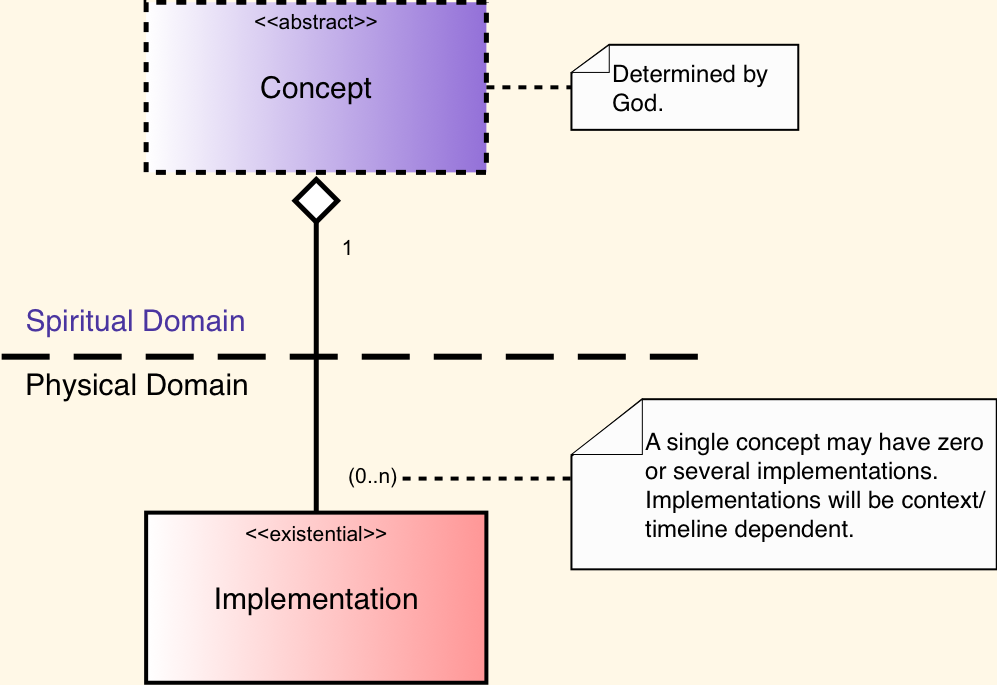
Covenant structure
The abstract covenant with mankind was well-researched and drawn up before the Lord set in motion a train of events which would lead to the formation of the universe and mankind. At the conceptual level, the abstract covenant contains information, declarations, and instructions. It contains details of God's objectives, but not how those objectives are to be implemented - the 'how' must await the mapping of the abstract covenant to its implementation in the real world.
For example, the requirement that none be allowed to starve in Israel would exist as an abstract command at the Spiritual Level. How this command might be obeyed must await God's mapping to the real world. A deep understanding of the real world would ensure that the most relevant and effective commandments would be put to Israel. However, multiple commandments might be required because the needs of those living in urban areas would differ from those living in rural areas. Then again, the needs might change as civilisation progressed. Necessarily, therefore, the instantiated Covenant must remain amendable in order to deal with changes in circumstances.
The Covenant and all related documentation are stored in the Ark of the Covenant. This means that although Paul, the unknown writer to the Hebrews, and the new-covenant church, have torn up their copy of the Covenant, the original policy still exists in the Heavenly Realm, beyond mankind's reach. Mankind are restricted to read-only access at the Spiritual Level.
If a legal contract is to be terminated, then it has to be done correctly. Were abrogation of the Mosaic Contract possible, then it would have to be formally carried out by the Lord God in Person; not only that, but the whole House of Israel - near and far - would require formal notification.
The Lord God could not annul the Covenant while there were some (eg: the likes of Simeon, the Twelve, Stephen...) who remained faithful to it; neither could he annul the Covenant while children and new converts were studying it prior to coming to a decision on reaching the Age of Discretion: otherwise He Himself would be in breach of contract.
As to the End of the Age, the Lord has given sufficient warning of His intentions, and can therefore terminate the Covenant and the world whenever He sees fit. For those sinners whose names are in the Book of Life, there will be a continuation of the Covenant; whereas, for those consigned to Hell, there will be no Covenant whatsoever.
Before the End of the Age, if the contract is active and in use, then it cannot be cancelled. Such an action would be illegal and actionable in law. Notice that the Covenant will be active and in use right up until the End of the Age. The Lord has made a timeline projection of the exponential descent into unimaginable evil. It shows that the Lord will bring the Age to an end before all the Covenant faithful are wiped off the face of the Earth:
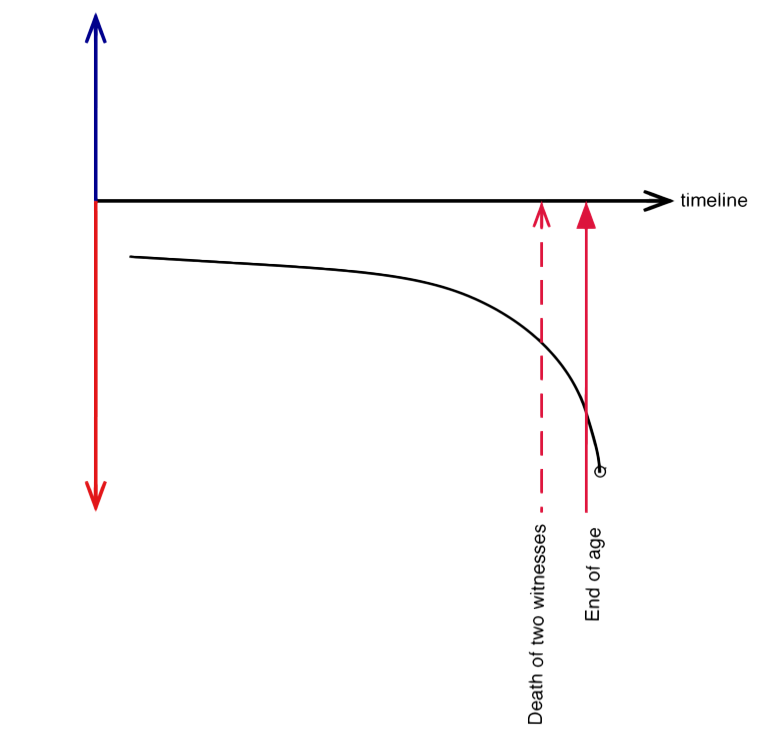
[15] "You will see 'The Awful Horror' of which the prophet Daniel spoke. It will be standing in the holy place." (Note to the reader: understand what this means!) [16] "Then those who are in Judea must run away to the hills. [17] Someone who is on the roof of a house must not take the time to go down and get any belongings from the house. [18] Someone who is in the field must not go back to get a cloak. [19] How terrible it will be in those days for women who are pregnant and for mothers with little babies! [20] Pray to God that you will not have to run away during the winter or on a Sabbath! [21] For the trouble at that time will be far more terrible than any there has ever been, from the beginning of the world to this very day. Nor will there ever be anything like it again. [22] But God has already reduced the number of days; had he not done so, nobody would survive. For the sake of his chosen people, however, God will reduce the days. (Matthew 24:15-22 GNT)
To terminate the contract without having something to put in its place would create a vacuum which the lord Satan and his followers would readily fill† - as has resulted from Paul's ill-advised pontificating (qv).
† [43] "When the unclean spirit has gone out of a person, it wanders through waterless regions looking for a resting place, but it finds none. [44] Then it says, 'I will return to my house from which I came.' When it comes, it finds it empty, swept, and put in order. [45] Then it goes and brings along seven other spirits more evil than itself, and they enter and live there; and the last state of that person is worse than the first. So will it be also with this evil generation." (Matthew 12:43-45 NRSV)
[5] The earth is also defiled by its inhabitants, for they violated laws, altered statutes, and broke the everlasting covenant.
[6] Therefore, a curse devours the earth, and those who live on it suffer for their guilt.
Therefore, the inhabitants of the earth decrease in number, and few people are left. (Isaiah 24:5-6 NASB)
[17] "Do not presume that I came to abolish the Law or the Prophets; I did not come to abolish, but to fulfill. [18] For truly I say to you, until heaven and earth pass away, not the smallest letter or stroke of a letter shall pass from the Law, until all is accomplished! [19] Therefore, whoever nullifies one of the least of these commandments, and teaches others to do the same, shall be called least in the kingdom of heaven; but whoever keeps and teaches them, he shall be called great in the kingdom of heaven. (Matthew 5:17-19 NASB)
[17] But it is easier for heaven and earth to pass away than for one stroke of a letter of the Law to fail. (Luke 16:17 NASB)
[Essay: The Everlasting Covenant.]
Version: 20-Feb-2024